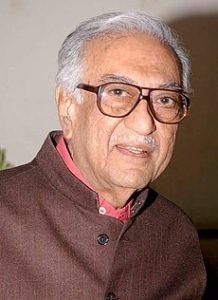 With the news of Ameen Sayani, the doyen of radio music presentation, passing away it seemed to be an end to a certain chapter in my life. Those were days when words like radio jockey, mobile app, Spotify, etc. were yet to arrive on our horizon. But in the small upper Assam town where we lived Wednesdays were special for me: the Binaca Geetmala day!
With the news of Ameen Sayani, the doyen of radio music presentation, passing away it seemed to be an end to a certain chapter in my life. Those were days when words like radio jockey, mobile app, Spotify, etc. were yet to arrive on our horizon. But in the small upper Assam town where we lived Wednesdays were special for me: the Binaca Geetmala day!
I waited the whole day to listen to the silky voice of Sayani announcing over Radio Ceylon: ‘behenon aur bhaiyon’ followed by airing of the hit parade of Hindi film songs. My mother scolded me as I listened to the Wednesday routine with exam only a few days away but I shot back almost defiantly, ‘If I don’t listen to Binaca Geetmala I’d do badly in the exam,’ and mother withdrew giving it up as a hopeless admonition.
Today when I read about his demise I traveled back to my early teen days, and suddenly the excitement of new youth, the whiff of a new world beyond the confines of a cloistered society, assailed my nose. I say a silent thank you to Sayani-ji for offering me a glimpse of that world.
Music somehow seems to get attached to certain memories. Our town used to organise fantastic all night music conferences in winter. I had the good fortune of listening to Ustad Bade Ghulam Ali Khan’s kheyal accompanied by Ustad Shamta Prasad at the tabla, and in the wee hours of the morning the plaintive notes of the shehnai in Bhairabi raag played by Ustad Bismillah Khan.
I was too young to understand the intricacies of Indian classical music but the notes did something to me. I fell in love with the classical genre of music that only expanded with years. In my memory I can also clearly see my parents, and many known faces who are there no more. The notes and the images of the loved ones are somehow intricately intertwined.
Music has no boundaries, it’s a cliché saying, I know. But it’s true. It has happened with my love for western pop music as well. Like my lifelong love for the Beatles. We were in a new town, Shillong, where my father got posted. From a quiet, traditional cultural milieu it was a new experience. Like most hill stations the ambience was very anglicized. The town was full of boarding schools run by Christian missionaries and most students seemed to speak only in English, a change for me too. Fetes were a big deal in the students’ lives hosted by different schools in summer.
These were occasions when girls and boys could escape the strict school norms, mix and match in adolescence’s jubilance and the ‘Father’s and ‘Mother’s looked the other way. It was on one of such fetes at the Loreto School that I heard a beat that quickened my pulse immediately: It’s a Hard Day’s Night. I didn’t have a clue who the Beatles were though the others seemed to sway to the beat but I resonated with the song instantly. The love affair, like for millions, has continued.
I went to New York’s Central Park’s corner with the black-and white mosaic memorial dedicated to John Lennon, where he was assassinated in 1980 to pay homage. Imagine… I hummed silently.
For me, Beatles’ songs and the memory of the first fragrance of youth with desire to discover a world beyond the sea emerge together. I suddenly understood why Wordsworth’s poem in our English lesson made sense : “Bliss it was in that dawn to be alive, But to be young was very heaven.”
Now that I hear Sam Mendes is going to make biopics on the fabulous four, individually, I wait, like many.
Yes music does it. Designating each phase of life with some indelible marks.
Viva la musica!
(TWF)



